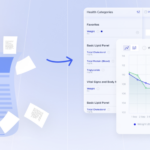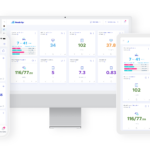Podcast: Play in new window | Download
Subscribe: Apple Podcasts | RSS
By using artificial intelligence with a human element, practitioners can design a functional health protocol that will allow patients to maintain their treatment plans.
Fullscript’s Dr. Alex Keller and Heads Up Founder Dave Korsunsky discuss how to deliver an entertaining and informative patient healthcare experience. Allowing patients to interact with and understand their data from their remote patient monitoring tools will drive them to stick to treatment plans long-term.
Heads Up
This podcast is brought to you by Heads Up, a web app designed to help both individuals and health practitioners centrally track the vital health data that matters. Instantly synchronize your (or your clients’) medical records, connect favorite health devices and apps, and use the data to optimize your health (and that of your clients).
Click on the button below to start your free 30-day trial. Or, read on for more information about our latest podcast episode!
Dr. Alex Keller
Dr. Alex Keller is a practicing naturopathic doctor in Ottawa, Canada and the Medical Director at Fullscript. As Medical Director, he oversees the Integrative Medical Advisory team (IMAT) and the development of educational content for practitioners across North America.
He is a graduate of the University of Ottawa with an HBSc in Health Sciences and Psychology. Although originally planning to attend conventional medical school, Alex shifted direction and completed a degree in naturopathic medicine at the Canadian College of Naturopathic Medicine. The shift followed a three-month internship at a rural Kenyan hospital where he worked with doctors who used local food to successfully treat patients, after which he felt compelled to practice a nutrition-oriented system of medicine. Today, he blends an evidence-based functional approach to care with his experience as an organic farmer and a passion for anthropology to serve as an expert in traditional and integrative medicine.
About Fullscript
Fullscript supports practitioners focusing on prevention and the connected, underlying causes of a patient’s symptoms. Thousands of integrative and functional health professionals are pushing for a shift to a more proactive perspective on lifestyle, patient care, and all of medicine.
These practitioners are on a mission to provide lifelong care that helps people discover and rediscover wellness for the rest of their lives. It’s Fullscript’s mission to support them — to help people get better. From practitioners to patients, partners, and colleagues, we build frictionless technology and personalized experiences to support those on their wellness journeys, whatever that means to them.
In this episode:
(1:50) A discussion around how medical professionals can design a functional health protocol for each patient and how you can track that functional health protocol through remote patient monitoring.
(6:33) Dave talks about taking the funnel concept of running a company and applying that to a medical protocol. Are patients opening the products? Are they even buying them.
(8:59) Providing patients with objective data will help them stick to the recommended treatment plan.
(11:16) How patients who have not fulfilled the treatment plan got tripped up on simple tasks like opening the plan within the email.
(12:51) Dr. Alex Keller’s team has a human care team to help clients with following the treatment plan. This team helps patients interpret the plan and ensure that patients stick to the functional health protocol.
(14:59) Platforms like Heads Up Health that track biofeedback measures like heart rate variability (HRV) help to motivate patients. Patients can become discouraged if they don’t notice symptoms improving short-term, but seeing the data of the changes happening within the body assists in making the patient maintain compliance.
(16:44) Gamifying the healthcare experience can help facilitate behavioral change.
(18:27) Blood glucose and HRV are great biofeedback markers to look for in patients within the first week of treatment.
(21:03) Dave gives a step-by-step analysis of how patients can understand their metabolic markers.
Step 1: Give patients an actionable target.
Step 2: Design a functional health protocol and set the second stage of the funnel.
Step 3: Confirm the person actually opens the email.
(22:30) Dr. Alex Keller does not see many integrative practices including a device that can do biofeedback collection (like a continuous glucose monitor). He gives diet, lifestyle, and supplement protocols. He also can tell patients to track blood values, biofeedback, and/or other markers.
(24:19) Dave talks about how patients develop awareness by using CGMs and platforms like Heads Up.
(28:26) Dr. Alex Keller discusses how the challenge in his field is what kind of standardization there will be. There are so many products that it can be overwhelming for somebody looking to track their biomarkers. Tracking the data with platforms like Heads Up can be used for large data-driven studies. Use Fullscript to initiate that process.
(32:49) Developing large data studies can help set treatment plans by aggregating data. The basic standard has been blood tests for the last decade. The next step forward could be much more in-depth.
(37:00) Keeping patients engaged in tracking will help them stay on their functional health protocol. It encourages the patient to maintain behavioral change and the practitioner can call the patient if they start to fall off the path.
(42:25) Dave discusses how using technology and AI could help scale the remote patient monitoring functional health protocol. AI can also be used to flag patients to their practitioners or lifestyle coaches.
(46:23) Dr. Alex Keller believes that AI will never replace humanity, but it can be used to help inform decisions. By including automated reminders in Fullscript, it helps keep patients on their treatment plans. His focus is to arm practitioners with tools to provide better user experiences for patients.
(49:21) Dave agrees that you need to combine AI and the human element. He sees positive change is happening with the new CPT codes and the payer system.
References
Dr. Alex Keller: LinkedIn | Instagram | Personal Website | Fullscript Website



















